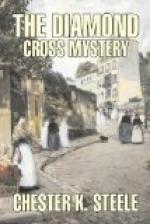One of the first places the colonel visited the next day was the jewelry shop. Matters there had nearly assumed their normal aspect. Trade was about the same, under the skilful management of Mr. Kettridge, and the cut glass and silver gleamed and glistened in the showcases as though the former owner of it all had not been cruelly slain.
“Show you her collection of coins? Certainly,” agreed Mr. Kettridge, when the colonel told what he wanted. “As I said, I saw them, and particularly the one we picked up last night, in her safe a week or so before she was killed. I was on for a visit. And I know that a week previous to that she had refused a thousand dollars for this particular one. These coins were one of her hobbies,” and he brought from the safe the collection, which was of considerable value to a numismatist.
“There seem to be others besides the Roman coin gone,” said the jeweler, “for I now miss many I used to see in her case. But, of course, she may have sold them. I do remember the one King had, though, and I’m sure she never sold that. It was taken close to the time she was killed.”
Colonel Ashley, taking advantage of the time when the store was closed for the night, minutely examined the safe, but could find no evidence of its having been tampered with.
“For what started out to be a simple murder case,” mused the old detective, as he went back to his hotel that night, “this one bids fair to become quite complicated.”
An impulse—it was hardly more than that, and yet it had to do with the matter in hand—sent the detective to police headquarters.
“I think I’ll ask Donovan what Singa Phut said when he was arrested and charged with murdering his partner,” said the colonel to himself. “There’s an end I haven’t developed very much. And I would like to ask that East Indian something about that queer watch.”
Donovan was at headquarters, it being his night “on,” and he welcomed the detective as some one with whom he might hold converse.
“Have a talk with Singa Phut? Why sure, if it will do you any good,” said the headquarters man when the colonel had made known his desire. “I was going to the jail on another matter, anyhow, and I might as well kill two birds as one. They’ll let you see him if I’m with you. Otherwise you’d have to get an order from the prosecutor’s office. Come along.”
It was raining when they reached the jail, and the colonel, as he heard the patter of drops, thought of the night he had first come to Colchester.
“There ought to be good fishing after this rain,” said the colonel, with a regretful sigh as he thought of his rods and flies.
“Fishin’!” exclaimed Donovan. “Say, that’s something I haven’t done since I was a kid! I used to like it, though. Well, here we are! Looks like a party. What d’you s’pose the warden’s all lit up for?”
Certainly the gloomy jail was more brightly lighted than usual at night, for the prisoners were locked in their cells and all illumination, save the keepers’ lights, put out at nine o’clock.




